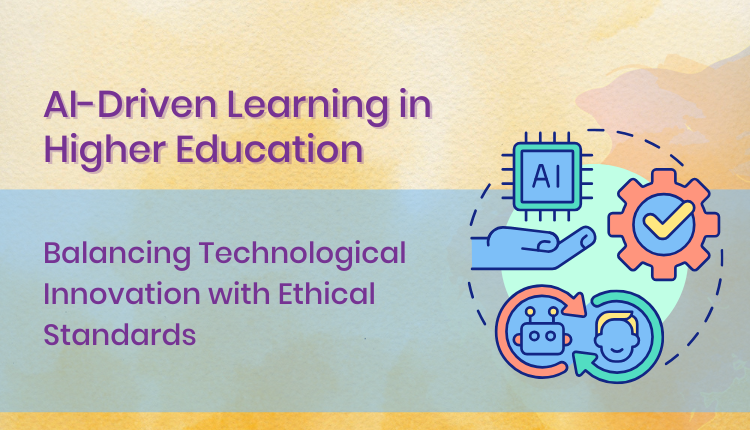AI-Driven Learning in Higher Education: Balancing Technological Innovation with Ethical Standards

The explosive rise in Generative AI (GenAI) usage among university students is transforming higher education at an unprecedented pace. According to a 2025 survey by the Higher Education Policy Institute and Kortext, 92% of students now use genAI, up from just 66% the previous year. Alarmingly, only 36% of these students have received any formal AI training. This divergence between use and understanding underscores a critical challenge for universities: how to harness the educational potential of GenAI while safeguarding academic integrity.
The New Normal: Widespread Adoption of GenAI
Students are integrating GenAI into nearly every aspect of their academic lives. From explaining difficult concepts and summarizing readings to brainstorming essay ideas, GenAI tools have become digital learning companions. Yet the line between support and substitution is becoming increasingly blurred. 18% students admit to directly copying AI-generated text into their assignments. While the vast majority use AI as an aid rather than a replacement, the risk of academic misconduct is real—and growing.
This growing reliance on AI is driven by pragmatic motives. Students report that GenAI saves time (51%) and improves the quality of their work (50%). However, their trust in these tools is tempered by legitimate concerns. Many worry about being accused of cheating or relying on inaccurate or biased outputs. As one student put it, “I enjoy working with AI as it makes life easier when doing assignments; however, I do get scared I’ll get caught.”
The Pedagogical Value of GenAI
While fears about cheating dominate headlines, the educational benefits of GenAI are equally compelling. A recent meta-analysis published in Humanities and Social Sciences Communications analyzed data from over 70 studies, the results revealed a large positive impact of ChatGPT on student learning performance. They also showed positive effects on learning perception and higher-order thinking.
Importantly, these benefits were observed across diverse educational contexts, including STEM, language learning, and academic writing. When applied with appropriate scaffolding and instructional design, AI can enhance understanding, support personalized learning, and stimulate critical thinking. However, the study cautions against uncritical adoption.
GenAI must be used strategically—tailored to course type, instructional model, and duration. For instance, four to eight weeks of structured AI integration yielded optimal learning outcomes. Using AI tools without guidance risks undermining their effectiveness and students’ learning independence.
Rethinking Assessment and Academic Integrity
The integration of GenAI poses a fundamental challenge to traditional assessment. As Josh Freeman, author of the Kortext report, warned: “Every assessment must be reviewed in case it can be completed easily using AI.” Universities must move beyond reactive detection tools, which are often unreliable and prone to false positives (inaccurately flagging human text as AI), and instead redesign assessments to value process over product.
Innovative strategies include:
- Reflective writing on AI use and decision-making
- Oral defenses of written work
- Annotated drafts showing AI interaction with innovative tools like DocuMark
- In-class synthesis and peer discussions
These approaches not only reduce the risk of misconduct but also foster metacognition and digital responsibility. They teach students not just what to think, but how to think in an AI-enabled world.
The Urgent Need for AI Skills Training
Despite near-universal usage, only a third of students receive formal AI training. This leaves them navigating powerful tools with little guidance, exacerbating confusion and ethical ambiguity. Moreover, the benefits of GenAI are not distributed equally. Students in STEM fields and from wealthier backgrounds report higher usage and confidence, highlighting a widening digital divide.
To close this gap, universities must prioritize AI literacy as a core academic skill. This includes:
- Teaching prompt engineering and source verification
- Embedding ethical AI use into coursework
- Leveraging tools like DocuMark to promote responsible AI use by encouraging students to review and verify AI-generated content.
- Providing frameworks like Bloom’s taxonomy to guide critical engagement
Such training empowers students to use AI thoughtfully, improving not only academic outcomes but also career readiness in an AI-transformed workforce.
Toward Inclusive and Informed AI Policy
The future of AI in education cannot be shaped in isolation. As institutions develop usage policies, they must incorporate diverse perspectives and global experiences. Inclusive policymaking ensures that AI integration reflects varied cultural, disciplinary, and ethical contexts.
To be effective, policies must:
- Be transparent and consistently communicated
- Balance innovation with integrity
- Encourage inter-institutional collaboration on best practices
As one student noted, current messaging is mixed: “It’s not banned but not advised, it’s academic misconduct if you use it, but lecturers tell us they use it.” Clear, supportive guidance is essential to reduce fear and misuse.
Teaching with, Not Against, AI
Generative AI is not a passing trend; it is reshaping how students learn, think, and express knowledge. Universities face a pivotal choice: resist this change and risk irrelevance, or embrace it by equipping students with the skills, ethics, and critical frameworks they need.
AI in education should not be feared or ignored—it must be taught, guided, and integrated with intention and care. Students who aren’t using Generative AI tools are now a tiny minority. To ensure every student is prepared for the future—and that academic standards remain uncompromised—AI literacy must become a strategic priority for every institution dedicated to excellence and equity in higher education.
Take the first step toward building true AI literacy on your campus. Schedule a personalized demo of DocuMark today and discover how our platform guides both educators and students to use generative AI responsibly, confidently, and ethically. Our team will tailor the experience to your institution’s unique needs, showing you how DocuMark fosters responsible AI use, strengthens student learning, and safeguards academic integrity at every level. Don’t let your institution fall behind—lead the way in AI education with DocuMark.
